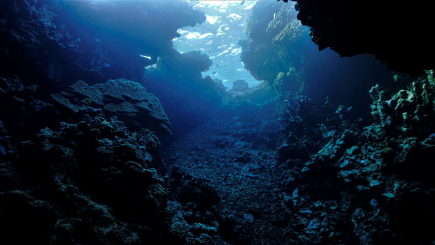
Learn oceanography with online courses and programs
Understanding oceanography is crucial for promoting marine conservation and harnessing the potential of oceans for sustainable development. Learn oceanography with online courses delivered through edX.

What is oceanography?
Oceanography is the scientific study of the oceans, encompassing various disciplines such as marine biology, physical oceanography, and marine geology. By examining ocean currents, marine life, seafloor geology, and seawater composition, oceanographers contribute to the collective understanding of the ocean's role in climate regulation, biodiversity, and the overall health of the planet.1
The field of oceanography is instrumental in addressing critical global challenges. It sheds light on how climate change impacts marine ecosystems, looking at events like coral bleaching and rising sea levels.2 Oceanographic research guides decisions related to sustainable fisheries management, coastal planning, the protection of vulnerable marine habitats, and more.
Browse online oceanography courses
Related Topics
Oceanography course curriculum
Oceanography blends chemistry, geology, meteorology, and biology.3 An oceanography course covers a wide range of basic and advanced concepts, providing an in-depth understanding of oceans and their processes as well as relationships within oceanic environments. Topics explored in an oceanography course might include:
- Physical properties of seawater: Study of temperature, salinity, density, and their variations.
- Ocean circulation: Exploration of ocean currents, tides, and waves.
- Marine life and ecosystems: Introduction to marine organisms, food chains, and ecological interactions.
- Coastal processes: Examination of coastal erosion, beaches, and estuaries.
- Oceanography and climate change: Analysis of the role of oceans in climate regulation, including global warming and ocean acidification.
- Marine geology and plate tectonics: Study of the seafloor, plate movements, and geological features like mid-ocean ridges and trenches.
- Biological oceanography: In-depth exploration of marine ecosystems, biodiversity, and conservation.
- Chemical oceanography: Investigation of seawater composition, nutrient cycles, and pollution.
- Remote sensing and data analysis: Utilization of satellite observations and data analysis techniques to study oceanographic phenomena.4
Whether you seek a solid introduction to biological science with a bachelor’s degree program or advanced learning in areas like ecology and sustainability through a master’s degree program, edX offers a wide range of courses that cater to diverse professional goals, backgrounds, and schedules. Explore the range of educational opportunities offered through edX which extend beyond degree programs and include executive education courses as well as accelerated boot camps designed for quick upskilling.
Find the right learning experience for you with edX.
Explore oceanography jobs
Within oceanography, individuals have the opportunity to specialize and pursue roles such as:5
- Biological oceanographer/marine biologist: Studies marine plants and animals, focusing on their development, relationships, adaptations, and interactions with the marine environment using field observations, models, and experiments.
- Chemical oceanographer/marine chemist: Investigates the composition of seawater, its processes and cycles, as well as chemical interactions with the atmosphere and seafloor. These professionals are trained to analyze pollutants and chemical impact on marine organisms. They also explore ocean currents, climate effects, and identify beneficial ocean resources.
- Geological oceanographer/marine geologist: Explores the ocean floor, studying its formation processes, history, plate tectonics, circulation, volcanic processes, and crustal formation. They look into ocean basin creation and interactions between the ocean and seafloor.
- Physical oceanographers: Focuses on physical conditions and processes within the ocean, including waves, currents, tides, erosion, atmospheric interactions, transmission of light and sound, and interactions with boundaries at the seafloor and coast.
Delve into the many subsets of oceanography or explore related areas like biological science, geochemistry, and sustainability with online courses delivered through edX.
More opportunities for you to learn
We've added 500+ learning opportunities to create one of the world's most comprehensive free-to-degree online learning platforms.
Oceanography. National Geographic. Retrieved on June 29, 2023.
How Does Climate Change Affect Coral Reefs?National Oceanic and Atmospheric Administration. Retrieved on June 29, 2023.
Oceanography. National Geographic. Retrieved on June 29, 2023.
Oceanography. NASA. Retrieved on June 29, 2023.
What Does an Oceanographer Do?National Oceanic and Atmospheric Administration. Retrieved on June 29, 2023.